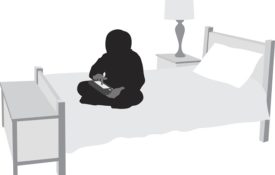-
Quarantine Fatigue: Why Some of Us Have Stopped Being Vigilant and How to Overcome It
If you've found you're no longer disinfecting your hands as often or becoming more lenient toward unnecessary trips outside, you're not alone. This unintentional phenomenon is "caution fatigue" — and you have your brain to blame. You were likely vigilant at the pandemic's outset, consistently keeping up with ways to ensure you didn't get infected with the coronavirus or infect others. The threat was new and urgent to your brain. And driven by the human instinct for self-preservation, fresh fear motivated you to eagerly adhere to recommended safety precautions. Fast-forward three months, and that sense of immediacy may have faded.
-
She Wrote a Book About Bias. Here’s How She Thinks Police Departments Should Approach Reform
Jennifer Eberhardt is a Stanford professor and MacArthur Genius award recipient who has worked with several police departments to improve their interactions with communities of color. In her 2019 book Biased: Uncovering the Hidden Prejudice That Shapes What We See, Think and Do, she examines the role that implicit bias—which she defines as “the beliefs and the feelings we have about social groups that can influence our decision making and our actions, even when we’re not aware of it”—plays a role in community-police relations, and how that bias can be overcome, managed or mitigated with evidence-led training. She spoke to TIME about what police departments should be doing now.
-
Public Shaming Has Become a Common Pastime During the Pandemic. But It Doesn’t Really Work
Public shaming, in this era of rapid judgment and ensuing internet outrage, is nothing new. But the pandemic has made it a popular pastime. Runners have been berated for exercising without masks. City dwellers have been criticized for congregating in parks. And beachgoers have been condemned for hitting the sand. The pandemic has heightened the stakes for every small decision we make about our lives, and people are naturally on edge. But experts say shaming other individuals for apparently going against the rules -- or, public shaming for what you may perceive as public good -- isn't usually the best route to take. Here's why we shame others -- and why we shouldn't.
-

Does Bedtime Media Use Harm Children’s Sleep? Only if They Struggle to Self-Regulate Behavior
Media use before bedtime translates to less sleep for some, depending on level of self regulation.
-

Annual NIH Ceremony Highlights the Importance of Behavioral Research
On June 8, the National Institutes of Health Office of Behavioral and Social Sciences Research (OBSSR) held its 2020 Matilda White Riley Behavioral and Social Sciences Honors, which recognizes a researcher who has conducted transformative behavioral science work supported by NIH and has shown leadership in the field.
-
The Best Way to Handle Your Decline Is to Confront It Head On
As a kid, I was sure that all old people must be afraid of death. As I have gotten older, however, it turns out that this is mostly wrong. There are, certainly, people my age (56) who are morbidly afraid of dying—there’s even a diagnosable psychiatric condition for this fear, called thanatophobia, and a whole movement, called transhumanism, dedicated to attempting to postpone death or avoid it altogether. But most older adults I know aren’t really terrified of death per se, but rather of being destroyed as sentient beings. No surprise, then, that what they—we—fear much more is a gradual, de factodeath from decline.

